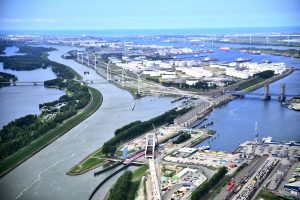 The European Commission has awarded a EUR 25 million funding to the Port of Rotterdam Authority and an international alliance of 45 companies, knowledge institutes and port authorities to implement 10 pilot and demonstration projects that focus on sustainable and smart logistics in port operations.
The European Commission has awarded a EUR 25 million funding to the Port of Rotterdam Authority and an international alliance of 45 companies, knowledge institutes and port authorities to implement 10 pilot and demonstration projects that focus on sustainable and smart logistics in port operations.
One of the consortium’s outputs involves the development of a master plan that sets out how transport in, to and from the ports can be made carbon-free by 2050, and what needs to be done in this context before 2030 and 2040.
The project comes out of a collaboration between the port authorities of Rotterdam, DeltaPort (Germany), Haropa Port (France: Le Havre, Rouen, Paris) and Sines (Portugal), in partnership with 10 research institutes and over 30 companies in the Netherlands, Germany, France, Portugal, Denmark and Sweden. The research project has been given the acronym MAGPIE: sMArt Green Ports as Integrated Efficient multimodal hubs. The research project will run for five years.
Several renewable fuels and energy carriers are currently being developed further, including green hydrogen, large electric batteries, ammonia, and bio-LNG. Each of these has its own advantages and challenges, with one option seeming more suited to shipping, another to applications within the port or transport to destinations in the hinterland.
Some links in the chain from production to consumption have already been tested, others have not. The consortium’s broad, international research programme primarily focuses on those aspects in the use of new fuels and energy carriers that have not yet been tested in practice. This includes production, transport, storage, fuels’ distribution, and charging (electric power).
The projects include the operation of an electric battery-powered locomotive that uses power from an overhead line for both motive power and for recharging its battery, allowing it to work in areas that lack an overhead line such as marshalling yards. Other examples include bunkering ammonia as a transport fuel, or electrical power from shore for ships moored offshore to a mooring buoy.
The partners will also design and implement several digitalisation and automation solutions in the context of the energy transition. In addition, they will be exploring how best to encourage companies to raise the sustainable and smart logistics processes.
The European Commission has made a budget available within the Horizon 2020 green deal programme for research into opportunities to increase the sustainability of logistics operations in sea ports and airports.
Share on:



